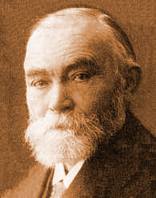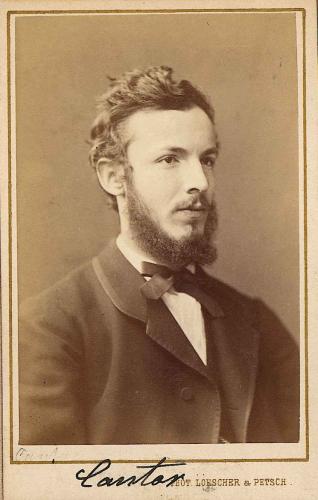 European Rationalism * "Our Pub" Library
European Rationalism * "Our Pub" Library Mathesis Universalis revisited owing to Cantor, Frege, Einstein and Gödel by Witold Marciszewski |
|
Let Einstein and Gödel, pictured at this photo (talking
during a walk in Princeton), symbolize two great streams of thought that
have met with each other to form our modern view on the dynamic and ordered
complexity of the world, including civilization as the world's most convoluted
realm.
As for Einstein, his general theory of relativity (1917),
supported with Hubble's astronomical observations, brought about an
astonishing reverse of our worldview on the universe. The firm centuries-old
belief in the static universe (initially shared by Einstein himself) has
dramatically given way to the picture of the universe evolving towards a
giant
dynamic complexity.
While Einstein and Hubble discovered the dynamics of
universe, Gödel revealed a boundless dynamics of the mathematical mind.
Insofar as mathematics forms a core of scientific thinking - according to
the Mathesis Universalis claim - other sciences get endowed with such a
limitless potential too. This enouraging fact is too often disregarded by
prophets of epistemological pessimism who falsely perceive Gödel's theorem
(on undecidability of arithmetic, 1931) as proclaiming helplessnes of human
mind in the face of unsolvable questions. In fact, this theorem means only
so much that in some hard cases it is a computer that gets helpless as
being, by definition, devoid of creativity. On the other hand, human beings
enjoy creative insights to solve hard problems on their own.
Gödel's result is to the effect that at any stage of
mathematical inquiry there are problems which cannot be solved in mechanical
manner (the only way available for computer) with those devices (axioms and
rules) which exist at the given stage of the theory in question. However,
new axioms or rules can be find out to solve some problems so far
undecidable. And when new undecidable cases arise, again the inventive
spirit of humans can succeed in devising new means to go ahead, and so on.
Gödel hinted at some efficient strategies for such inquiries, which can be
successively adopted without limitations.
More on this subject - see
Issues of Decidability and Tractability,2006, vol.22 of "Studies
in Logic, Grammar and Rhetoric"). In this volume, in the article The Gödelian speed up [..] I argue
(following Gödel's idea) that with new devices we are able to produce the
mind solves problems which previously were to complex to be efficiently
tackled, and so there is an infiniet perspectove to attack ever more highere
levels of comlexity. This contention complies with other ones to be found in
literature, e.g. the following statement by Yi-Zhuang Chen: "[...] from the
viewpoint of the content of Gödel's theorem, it justifies the basic view of
complexity paradigm according to which knowledge is a dynamic, unfinished
process, and develops by way of self-criticism and self-transcendence." See
Edgar Morin's Paradigm of
Complexity and Gödel's Incompleteness Theorem" in: "World Futures",
2004 60 (5-6):421-431. These two revelations, one regarding the universe, the
other concerning mind, take us closer to materialization of the old dream about
Mathesis Universalis. However, to figure out how that happens, we should
have a look at two other mental breakthroughs, due to the founding fathers
of mathematical logic and the theory of infinite sets. Logic helps to
perceive the nature of mechanical reasoning (owed to logical formalism); set
theory reveals power and boldness of the human mind to address
infinity.
On the left we see Erhard Weigel, who in
the period 1652-1699 was a mathematics professor at Jena University, on the
right Gottlob Frege
who was a mathematics professor at the same University between 1879 and
1918.
Such a striking concidence of their professional careers
would not deserve so much attention, did not they share a great intellectual
design, to wit Mathesis Universalis. In Weigel's time such a design was just
a vision of what ought to be done, while Frege's time was ripe enough to
materialize such a vision. This idea inspired a lot of great thinkers. Among them was
Rene Descartes who made it popular in the 17th century, and with his
analytical geometry made a significant step towards a partial realization of
the programme. However, in a further progress he was blocked by his dislike
of formal logic, while just the formal-logical approach has proved the way
from conception to completion.
It was Weigel who more efficiently tried to combine
Aristotelian logic with Eucklidean mathematics as a step towards Universal
Mathematics -- below refwerred to as MU. And, what is even more
important, as mathematics teacher of young Leibniz, equipped him with
knowledge and encouragement to face the challenge. In fact, Leibniz did not
fail to become the most important figure in the development of MU till Frege.
He transmitted Weigl's idea through centuries up to Frege
who explicitly declares his intention to continue Leibniz's project of MU as
involving both the ideal langage (lingua charactersitica) and formal logical
calculus (calculus ratiocinator). For Frege's intention has been cerried
out, first, in the work with much speaking title Begriffsschrift, eine
der arithmetischen nachgebildete Formelsprache des reinen Denkens (Jena
1879).
To let readers learn about a
much different approach to MU, focussed on phenomenological interpreatation
by Edmund Husserl, while omitting the role of Frege and the further
development towards theoretical computer science, I recommend Raul
Corazzon's report in Web entitled "Mathesis
Universalis: the Search for a Universal Science". However, Frege's
contribution to logical modernization of MU is widely acknowledged among
scholars, as testified with such classics as e.g. E.H.W. Kluge's The
Metaphysics of Gottlob Frege, (Nijhoff, the Hague etc. 1980), Michel
Dummets Interpretation of Frege's Philosophy (Duckworth, London 1981,
e.g. p.302 ff.) etc. The title which Frege gave to his study in three phrases
renders three main intentions of the Leibnizian MU.
As to 1. MU was to be an ideographic language in which
graphical signs would be directly coordinated with (concepts) ideas, i.e.
without any mediating of an ordinary spoken language (as was e.g. in
Aristotle's logic). All these features of Frege's work are essential for each
system of contemporary symbolic logic, and this is a way in which symbolic
logic may be deemed as MU revisited. With examining how is MU related to
Cantor's settheoretical ideas, we shall make a next step towards the
informational worldview -- as a modern embodiment of MU vision.
Georg Cantor's (1845-1918) role in creating the modern MU
version is tremendous. While Frege devises a conceptual notation and an
efficient calculus for reasoning (Leibniz's calculus ratiocinator) as
one of the two MU modules, Cantor provides us ingeniously with the other
module: a language based on some primitive notions which are to be basic not
only for the language of mathematics but the whole knowledge as well. Such a
universal language was by Leibniz named in many ways (see Kluge quoted in
§2, p.234); among all of them the most fitting appears to be lingua
universalis.
These primitive notions play the
key role in drawing the borderline between the finite and the infinite. This
distinction entered the basics of informational worldview. It displays a
crucial difference between the mechanical and the creative way of processing
information in a problem-solving behaviour. Leibniz's considered a number of concepts for the role of conceptual primitives (called also semantic universals). However, he failed to notice that it is the notion of set (or class, in an alternative vocabulary) which should be the most favourite candidate. Its meaning gets characterized with a set of axioms, and then (with the help of some logical terms) serves as basis to introduce other notions, including that of equinumerosity or (another term) equipollence, having a great import on developing the universal language. Two sets are said to be equinumerous if there is one-to-one correspondence between their elements (as, say, between fingers of left and right hand). A composition of these two ideas results in defining number (more precisely, cardinal number) as something what any two equipollent sets have in common (say, having five elements as feature shared by sets of hand fingers). Thus the Leibnizian strategy -- of composing more complex notions out from simpler ones -- gets realized. According to the same strategy, so defined idea of cardinal number becomes the basis to successively introduce more composite numbers (negative, rational, real etc).
The notion of equinumerosity plays a decisive role in making us aware of singularities of infinite sets. A set is infinite then and only then when it has a proper part equinumerous with the whole set; say the set of prime numbers being equinumerous with the set of all natural numbers in which it is included, i.e., forms a subset. However, not every infinite set having an infinite subset is equinumerous with it. Cantor was the first who noticed and proved the astonishing fact that the infinite set of natural numbers, being a subset of infinite set of reals, does not equal the latter: there are more real numbers than natural numbers. Now, to render the relation between MU as a legacy handed over to us by earlier ages, and its modern realization in our time, let us observe the following. Some items of the original project which for the lack of relevant devices could not be carried out by its originators, have been completed with modern logic. We have got the conceptual language of symbolic logic, and very efficient calculus for deduction, as well as the method of successiwe introducing more complex notions on the basis of simpler primitives. The Cantorian notion of set as the fundamental primitive idea, symbolic languages of Frege, but also those of Peano, Russell, Hilbert, £ukasiewicz etc., exemplify the accomplishment of characteristica universalis, while the logical calculus initiated by Frege, and developed in various versions by those mentioned above, forms a fulfillment of the Leibnizian dream of calculus ratiocinator. Moreover, such calculi are being performed effectively by machines, as Leibniz prophetized to come. However, the idea of universal mathematically shaped knowledge must have deeply changed in the face of dramatic changes in our picture of the world. The universe as seen by modern people is no longer a closed static reality. Instead, it appears to us as an open and dynamic system tending to ever greater complexity. This understading started with the discovery of the universe's evolution as reflected in Einstein's general relativity, hence its significance for the modern MU. While exploring ever new realms of the universe, that display a growing complexity, we need more and more advanced mathematical models, as exemplified with the history of relativity and quanta. This continously moves the frontiers of modern MU ahead, and shows that it is not likely to reach whenever a final stage. On the other hand, Gödel teaches us optimistically that the dynamics of human mind is able to keep up with the dynamically growing complexity of research problems. This is a corrolary to Gödel's statement that at any phase of the development of arithmetic there are problems not solvable in it in a mechanical way, but the mind's creative intuition can devise fresh axioms and rules to create new means of mechanical problem-solving. However, when the word "intuition" appears, one may wonder if we remain true to the very MU idea, since MU should have provide us with means of solving any problem whatever in a computational ("calculesmu"), that is, mechanical manner. |
 §1. Einsteinian dynamics
§1. Einsteinian dynamics 

